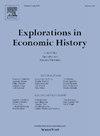财富与历史:重新评估
IF 1.7
1区 历史学
Q1 ECONOMICS
引用次数: 0
摘要
本研究重新审视了自工业化开始以来财富不平等和财富积累的趋势和驱动因素。实证分析表明,与一个世纪前相比,今天的西方国家更加富裕,也更加平等。在过去的一个世纪中,所有国家的财富集中度都有所下降,欧洲保持在历史最低水平,而美国则有所上升。这些趋势主要是由中下层阶级新的财富积累(主要是通过住房和养老金储蓄)驱动的,而不是富裕阶层财富的减少。研究结果对无管制的资本主义必然导致财富极度集中的观点提出了质疑,并对财富均等化需要战争或累进税等资本冲击的观点提出了质疑。相反,这些证据强调了经济和政治体制的公平效应,使普通人能够积累个人财富。本文章由计算机程序翻译,如有差异,请以英文原文为准。
Wealth and history: A reappraisal
The study revisits trends and drivers of wealth inequality and accumulation since the onset of industrialization. Empirical analysis reveals that Western countries are both wealthier and more equal today than a century ago. Wealth concentration has declined in all countries over the past century, remaining at historically low levels in Europe, while rising in the United States. These trends are largely driven by new wealth accumulation among the lower and middle classes, primarily through housing and pension savings, rather than a decline in the fortunes of the affluent. The findings challenge the view that unregulated capitalism inevitably leads to extreme wealth concentration and question the idea that wealth equalization requires shocks to capital, such as wars or progressive taxation. Instead, the evidence emphasizes the equitable effects of economic and political institutions that enable ordinary individuals to build personal wealth.
求助全文
通过发布文献求助,成功后即可免费获取论文全文。
去求助
来源期刊

Explorations in Economic History
Multiple-
CiteScore
2.50
自引率
8.70%
发文量
27
期刊介绍:
Explorations in Economic History provides broad coverage of the application of economic analysis to historical episodes. The journal has a tradition of innovative applications of theory and quantitative techniques, and it explores all aspects of economic change, all historical periods, all geographical locations, and all political and social systems. The journal includes papers by economists, economic historians, demographers, geographers, and sociologists. Explorations in Economic History is the only journal where you will find "Essays in Exploration." This unique department alerts economic historians to the potential in a new area of research, surveying the recent literature and then identifying the most promising issues to pursue.
 求助内容:
求助内容: 应助结果提醒方式:
应助结果提醒方式:


